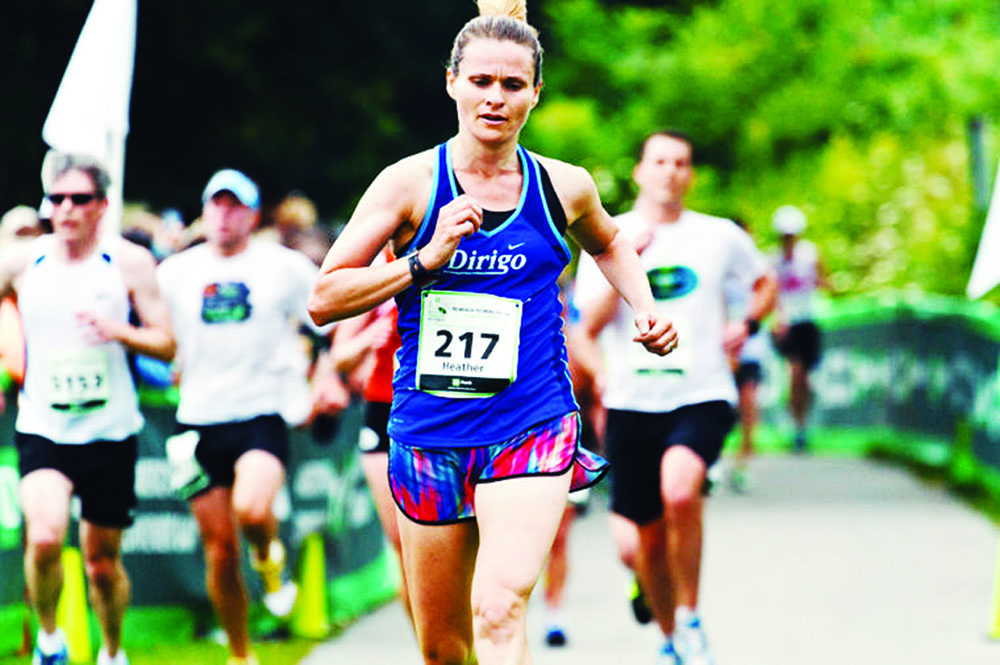Therapy At Your Feet: How Running Beats Depression
Running puts everyone in a better mood. But for some of us, our kays are key to managing depression and anxiety.
Most Tuesdays, I run early in the morning with a woman named Meredith. For such close friends, we’re quite different. Meredith is a talkative social worker who draws energy from crowds. I’m an introverted editor who works from home. Meredith runs her best in large races and loves training with big groups.
I’ve set PBs in solo time trials and tend to bail when a run’s head count gets above five. Meredith is a worrier, beset by regrets and anticipated outcomes, who has sought treatment for anxiety. I have dysthymia, or chronic low-grade depression. We like to joke that Meredith stays up late as a way of avoiding the next day, whereas I go to bed early to speed the arrival of a better tomorrow.
We do have one key thing in common: we run to bolster our mental health. Like all runners, we relish the short-term experience of finishing a run feeling like we’ve hit reset and can better handle the rest of the day. What’s not universal is our recognition that without regular running, the underlying fabric of our lives – our friendships, marriages, careers, odds of being something other than miserable most of the time – will fray. Running is our medicine.
Meredith and I discovered this decades ago, and now researchers and practitioners are starting to catch up. Studies show that aerobic exercise can be as effective as antidepressants in treating mild to moderate depression (and with side effects such as improved health and weight management, rather than the bloating and sexual dysfunction associated with pharmaceuticals).
In countries such as Australia, the United Kingdom, and the Netherlands, official guidelines include exercise as a first-line treatment for depression. Although US guidelines have yet to change, some psychotherapists now conduct on-the-run sessions with willing patients.
How does moving the body change the mind? A wealth of work – both in the lab and with patients – shows that there’s more to it than endorphins, the well-known opioids the body produces during certain activities, including exercise. The emerging, more sophisticated view of running’s ability to improve mental health also takes into account long-term structural changes in the brain, as well as subjective states such as mood and cognition. Science continues working to explain the theory behind what we runners already know from practice.
RUNNING CHANGES HOW YOU THINK
Unlike many with the condition, I’ve never been majorly incapacitated by depression. Most people would consider me productive, accomplished, even energetic, given a lifetime running odometer of 170 000-plus kilometres. My dysthymia has two main components: weltschmerz, a German word meaning sadness about how reality doesn’t live up to one’s hopes, and anhedonia, or a diminished ability to experience pleasure.
Life often feels like waiting out a series of not-horrible, not-fun obligations. Sometimes things seem so pointless that I watch myself not caring that I don’t care. For example, I once received a group email that a book I’d co-authored had made the New York Times bestseller list. That’s a big deal in publishing. As if from outside my body, I observed myself writing an exclamation-mark-filled reply-all response, thanking and congratulating those of us who worked on the book. As I typed, I really thought, Yeah, fine, whatever. Is this actually going to lift my life on a grey Tuesday in March?
That it’s possible to be outwardly active but internally askew can mask just how common depression and anxiety are. In any one year, about 10 per cent of the US population would meet the diagnostic criteria for depression, and about 20 per cent for anxiety. (The two often co-exist.) The incidence of these conditions in runners is probably similar; a 2017 review of research published in the British Journal of Sports Medicine found no difference in depressive symptoms between what the researchers called “high-performance athletes” and non-athletes. All levels of runners are affected, with elites such as Olympian Adam Goucher and Western States 100-mile champions Rob Krar and Nikki Kimball having spoken publicly about their depression.
Of course, everybody gets sad and worried at times. What distinguishes those feelings from clinical depression and anxiety? In the short term, therapists often look for significant changes in emotions, behaviour, and psychological functioning. They also focus on how symptoms such as feeling agitated, threatened, and uncomfortable (for anxiety) or joyless, lethargic, and apathetic (for depression) interfere with people’s everyday functioning.

“I look at how these things affect activities of daily living, like sleeping, going to work, interpersonal relationships,” says Franklin Brooks, PhD, a clinical social worker. “There’s a profound difference between ‘I’m having a bad day at work’ and ‘I’m having a bad day at work and I’m not going to get out of bed tomorrow because of it.’ ”
That classic depiction of depression sounds like what Amelia Gapin, 34, a software engineer and marathoner from New Jersey, has experienced. “I’ve had episodes where for six weeks, two months, I couldn’t even get myself out of bed,” she says. “During the weekends, it was wake up and take a couple of hours to move myself to the couch.”
The sentiment is echoed by Ian Kellogg, 22, a 14:43 PB 5K runner at Otterbein University in Ohio. “When I fall into depression, more often than not I don’t run. I can’t find the energy or willpower to get out the door, even though I know my training is suffering and that just half an hour will make me feel better.”
Others have found a way to use running as a solution to overcome this form of depression. In June 2015, Pati Haaz, a finance professional from Kendall Park, New Jersey, had a miscarriage while two months pregnant. She became severely depressed, and started missing work. “I didn’t want to get out of bed, I didn’t want to go out of my house,” she says. “It was that feeling that there’s no point in continuing.
I had no motivation to do anything other than take care of my kids, which was more an automatic duty.” Guilt over being depressed – “feeling like I’m the worst mother in the world” – compounded the situation.
Haaz started seeing a therapist, who asked about her pre-depression hobbies. The 43-year-old said that she was a runner who before becoming pregnant, had planned to run her first marathon that autumn in New York. The therapist encouraged her to resume running. Haaz decided she needed the goal of finishing a marathon to overcome the inertia that depression had introduced to her life.
“If I was running for the sake of running, I would have stopped with my normal 10-K run,” Haaz says. “But in marathon training, I was doing 25, 30, 35 kilometres, things I’d never done before. I was able to carry this sense of accomplishment into other areas of my life.”
Even her shortest runs helped Haaz think differently. “If I was driving or working or waking up in the middle of the night and thinking about the things that were making me sad, it would just make things worse – it would become like a spiral, and there was no end to it. But when I was running, I would think about those same things, and somehow I was able to process them differently. I would start my run with all these negative thoughts, and after a kilometre or two, they were gone.” Five months after her miscarriage, Haaz finished the New York City Marathon in 6:38.
Reframing ruminations – thinking differently about hashed-over topics – is one of the main appeals of running for those of us with mental health issues. Cecilia Bidwell, 42, an attorney who has anxiety, puts it this way: “When I’m running, the thoughts come in and out, and I’m not worried,” she says. “I can think about things objectively. I realise that things I think are a huge deal aren’t, in the scheme of things.” The effect carries through Bidwell’s stressful workdays. “When I’ve gone for a good run in the morning, if things are going haywire at 2pm, I handle them a lot better. I’m not creating crises, and wondering Why am I here?”
The more immediate cognitive focus of a typical run also helps. “When we’re overwhelmed with anxiety and depression, shifting from the big picture – all the frustrations, worst-case-scenario thinking – to the in-the-moment task of doing something that approaches a goal, like running a six-kay loop with two hills, will kick off a positive feedback loop that continues throughout the run and takes our thinking and emotions out of the trench of negativity,” says psychologist Dr Laura Fredendall.
These changes in mood and thinking are more accessible for runners. In a 2008 study published in the Archives of Physical Medicine and Rehabilitation, ultra-marathoners, moderate regular exercisers, and non-exercisers walked or ran for 30 minutes at a self-selected pace that felt somewhat hard. After the workout, everyone’s mood had improved, but that of the ultra-marathoners and moderate exercisers did so about twice as much as that of the sedentary people. Also, the ultra-runners and regular exercisers reported greater vigour and less fatigue after the workout than before, while the non-exercisers felt the same.
That’s because runners can hold a good pace for a long time without going anaerobic, allowing for the physiological processes that lead to improved mood, according to Dr Panteleimon Ekkekakis, a university professor who is a leading figure in the field of exercise psychology.
“In sedentary people, their ventilatory threshold – the point at which exercise is no longer purely aerobic – is very low,” he says. “So they get up off the couch, they take a few steps, they’re already above their ventilatory threshold. If you’re a regular runner, you have the cardio-respiratory fitness to sustain an exercise intensity that’s associated with a feel-better effect.”
A CHEMICAL ROMANCE
What causes that feel-better effect? The quick answer you typically hear is endorphins, but focusing on the nebulous ‘runner’s high’ ignores crucial changes in brain structure and thinking patterns that running can induce.
Endorphins entered the runner’s lexicon in the 1970s when it became known that these chemicals, which bind to neuron receptors in the brain, are released at higher levels during a run. Several studies found that higher blood levels of post-run endorphins correlated to improved mood. In 2008, German researchers used PET scans, an imaging study often used to check for cancer, on triathletes’ brains while the athletes ran for two hours. They found high levels of endorphins in the prefrontal cortex and other parts of the brain associated with mood, and that these levels aligned with the athletes’ reports of euphoria.
RELATED: 8 Ways To Be A More Positive Runner
But endorphins aren’t everything. As part of his research into human evolution, David Raichlen, PhD, a professor of anthropology at the University of Arizona, has measured pre- and post-run endocannabinoid levels in runners, dogs, and ferrets. Endocannabinoids are substances that bind to the same receptors in the brain as THC, the primary substance responsible for a marijuana high.

Raichlen says there are two leading theories on why running causes increased levels of endorphins and endocannabinoids. First, when humans became hunter/gatherers close to two million years ago, they became more active; the release of these chemicals, which act as pain relievers, may have evolved to allow longer, faster movement. In this scenario, the feel-good aspect is a by-product.
Second, higher levels of these chemicals while active could have motivated continued movement, which would lead to getting more food, and ultimately, higher survival rates. Raichlen says the two mechanisms might have worked in tandem.
RELATED: The 12 Habits of Highly Motivated Runners
Whatever the original mechanism for these evolutionary adaptations, they’re especially helpful for modern runners with mental health issues. It’s nice to run for an hour and go from being in a good-enough mood to a better one. It’s a fundamental shift to go from being miserable to content, thanks to an infusion of feel-good substances. “I’ll finish a run and be like, Wow, this is how most people feel all the time, ” Bidwell says.
A short-term mood boost because of endorphins and endocannabinoids is one thing. (Granted, one much-appreciated thing.) But where running really helps with mental health is over time, thanks to a change in brain structure. A review of research published in Clinical Psychology Review concluded that “exercise training recruits a process which confers enduring resilience to stress”. This appears to occur because regular running produces the same two changes that are thought to be responsible for the effectiveness of antidepressants: increased levels of the neurotransmitters serotonin and norepinephrine, and neurogenesis, or the creation of new neurons.
Neurogenesis occurs primarily due to a protein called brain-derived neurotrophic factor (BDNF), which has been called ‘miracle food for the brain’. “It helps neurons fire and wire together,” Fredendall says. Much of this happens in the hippocampus, an area of the brain that’s often shrunken in people with depression. “MRI scans have shown that even after a six-month exercise intervention, there’s a visible increase in the size of the hippocampus,” Ekkekakis says.
As Ekkekakis notes, you have to be fit to really get the daily benefits that can lead to structural changes. Of course, you also have to get yourself out the door, which can be especially difficult if you’re depressed. But success in running on an especially tough day makes it easier to get out the next time. And it can spur another key mental health benefit of running.
I THINK I CAN, I THINK I CAN
Levels of chemicals in the brain are only part of your mental state. There’s also cognition, or mental processes. Cognition includes not just straightforward thinking (‘I should run long today, because a blizzard is coming tomorrow’) but also more involved phenomena, such as how you think about your thoughts.
A hallmark of depression is self-defeating, absolutist thinking – ‘everything is harder than it should be’, ‘there’s no pleasure in my life’, ‘it’s always going to be like this’. I’ve learned that lacing up and hitting the roads is my best way to break free from such thoughts. On a daily basis, running reminds me that I can overcome apathy and torpor. Seeing that small victory, I can convince myself that progress is possible on meeting professional goals, or not feeling lonely so often, or figuring out how to afford retirement. “The subjective experience of seeing yourself do something can make you feel better,” Fredendall says.
RELATED: Make Your Dog Your Running Partner
Ekkekakis says cognition is key to understanding another aspect of running’s effectiveness. “If you take antidepressants and they make you feel better, the psychological attribution is external – patients believe that the reason they get better is because of the drug they take,” he says. “With exercise, the attribution is internal – the reason I get better is that I’m doing this thing, I’m putting in the effort. That’s where perhaps the additional benefit of exercise compared to antidepressants lies – that sense of empowerment, that sense that I’m taking control of my situation.”
YOU DON’T HEAR ABOUT THE GOLFER’S HIGH
Is there something uniquely effective about running for managing mental health? Or can any form of exercise provide similar relief?
The short answer is that nobody knows for sure, and definitive research comparing the mood-boosting properties of various ways of working out is unlikely, because of the increase in complexity. “Such a study would have multiple arms – optimal intensity, duration, or frequency of different forms of exercise – so you go from a study costing R10 million to R30 million,” Ekkekakis says. “The amount of government funding available is simply not at that level.” (According to the World Health Organisation, depression is the leading cause of disability and poor health worldwide, but on average only
three per cent of government health budgets is spent on mental health issues.)
It is safe to say that purposeful exercise is better than incidental physical activity. A study published in Medicine & Science in Sports & Exercise found improved mood in people after they worked out, but not after daily-living activities such as climbing stairs. Aerobic exercise seems more effective than something like lifting weights. In fact, a review of research published in Preventive Medicine found that people with low levels of cardiovascular fitness were at greater risk of developing depression.
When I asked Raichlen about running compared to other activities, he began by citing more studies on endocannabinoids, and talking about “mechanical pain” and “analgesic triggers”. Then the practical runner in him took over.
“It’s easier to get yourself into a reasonable intensity by running compared to other sports,” he says. “It’s not too difficult to get in the right zone and stay there. And you have more control over your speed than in something like cycling, where effort is dictated by topography or even traffic lights.”
That’s been my experience over the last nearly four decades. When I’ve been injured, and switched to cycling or pool running, the workouts themselves are like proverbial castor oil – I do them because I know I need them, not because I think they’re enjoyable. The net that keeps me from plummeting starts to fray and sag.
When running is going well, the net is taut and strong. A few times a month, usually while cruising along a wooded trail speckled with morning light, I’m overcome with a sensation best articulated as simply ‘yes’. Yes to the moment, yes to whatever is in store the rest of the day, yes to life itself. If I could bottle that feeling, I’d eventually forget what it’s like to be depressed.
WHAT RUNNING DOES FOR ME
Four different takes on how lacing up can boost mental health.
IT SHOWS ME WHO I AM. / Stephen Crane, 42, stay-at-home father

I started running in 2015 because I was gaining all my weight back after gastric bypass surgery. My daughter said, “You had that surgery so you could be more active with us, and you aren’t. I want to run a family 5K with you, but I don’t know if you can do even that.” That day, I tried to run around the block. Six months later we did a 5K. At one point during the race, I noticed the look on my daughter’s face, and for the first time I felt like I was leading my family in a positive direction. Soon after, I went off the antidepressants I’d been on for years.
RELATED: 10 Mental Tricks To Run Stronger
From a young age I’d always counted myself out before I even started. Running was the first thing that made me realise that my perception of myself was holding me back, and setting running goals has shown me how much I can accomplish just by believing in myself. I started running because I didn’t want to break my daughter’s heart. I didn’t know it would save my life.
IT PUSHES MY LIMITS / Heather Johnson, 43, marketing/business development professional

I had my first panic attack when I was 13. At that age, I had many physical symptoms of anxiety – racing heart, sweating hands, shakiness, dizziness, and diarrhoea. As an adult, I experience fewer physical symptoms but more racing thoughts, rumination, and an insatiable need to know everything that is dangerous and how to avoid it.
I started running in 1998, the year that I stopped using alcohol as my crutch to manage my anxiety. Running is the best cure for the swirling thought-storm in my head, because it continually exposes me to anxiety-provoking environments where I get to practise abating negative self-talk, push through my fears, and accept the unknown.
IT EASES MY ANXIETY / Alison Désir, 32, founder of Harlem Run and Run 4 All Women

Growing up, I was really active, but I didn’t come to distance running until 2012. I was going through a bad period of depression: my father was seven years into a dementia diagnosis; I had graduated with a master’s degree but couldn’t find a job; my boyfriend was cheating on me. One of my friends was training for a marathon. He was not what I would call a typical runner – he was an average-looking black guy, not a tall, skinny white guy – and he made it seem like it was possible.
I decided I would take the leap and sign up for a marathon. The programme gave me a concrete plan that promised I would achieve a certain set of results. And I started to apply that approach in my life. I got my discipline back, I got a job. That first marathon experience not only helped me mentally and physically, it got me back into society. I haven’t suffered from depression since then. As for my anxiety, there’s something about running that allows me to see different possibilities and come to different conclusions. There are also times, if I’m particularly anxious, that I’m able to home in on my breathing or a mantra and just not think about anything. It’s like meditation.
IT GIVES ME FOCUS / Grayson Teng, 23, nursing student

In 2013, when I needed to be getting good marks to be accepted into a nursing degree, I was slacking off. I thought, I was clever in high school, I’ll be fine. But the bad marks kept coming. I was convinced I’d ruined my one big dream, to become a nurse. I started having feelings of apathy, isolation, guilt, shame, and worthlessness. Overall, I just felt numb. I’ve been a runner since high school.
When I was really depressed, I reminded myself how good running makes me feel. I found if I could just get outside and run on trails, get some sunlight and fresh air and nature, I’d feel better – free, rather than trapped with my negative thoughts, and serene, focused, and clear. I’d finish a run and think, I know what I have to do to get things done. Let’s get started. So I turned to running to get back on track at varsity. Now I run 40km a week. I consider it preventive, as a way to keep those negative feelings from overwhelming me again.
READ MORE ON: anxiety depression health therapy

